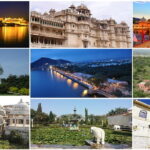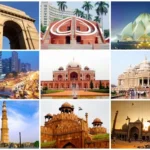Here’s a detailed guide to some of the best shopping places in Jaipur, renowned for their vibrant offerings of traditional crafts, textiles, jewelry, and modern shopping experiences:
- Johari Bazaar: Known for its exquisite jewelry, Johari Bazaar offers a dazzling array of traditional Kundan, Meenakari, and Polki jewelry, along with gemstones and semi-precious stones. The craftsmanship here is exceptional, making it a must-visit for jewelry enthusiasts.
- Tripolia Bazaar: Located near the City Palace, Tripolia Bazaar is famous for lac bangles, fabrics, and brassware. Here, you can shop for colorful leheriya and bandhani sarees, traditional Rajasthani quilts (razais), and a variety of brass utensils and decorative items.
- Bapu Bazaar: A shopper’s paradise for textiles, mojari (traditional Rajasthani footwear), and souvenirs. It’s particularly renowned for block-printed fabrics, bandhani dupattas, and Jaipuri quilts. You can also find a wide range of Rajasthani jootis (footwear) in different designs and colors here.
- Chandpole Bazaar: Known for fabrics, marble sculptures, and ironware, Chandpole Bazaar is a great place to shop for Jaipuri quilts, marble statues and sculptures, and traditional Rajasthani handicrafts like Bandhej (tie and dye) fabrics and leheriya sarees.
- Nehru Bazaar: Famous for textiles, jootis, and blue pottery, Nehru Bazaar offers a variety of Rajasthani fabrics including sarees, suits, and dupattas. It’s also a hub for blue pottery, known for its intricate floral designs and vibrant blue hues.
- MI Road (Mirza Ismail Road): Besides being a major thoroughfare, MI Road is a popular shopping destination with a mix of branded stores and local shops offering textiles, handicrafts, jewelry, and footwear. It’s known for its boutiques blending traditional and modern fashion.
- Sireh Deori Bazaar: Located near Hawa Mahal, Sireh Deori Bazaar is known for lac jewelry, textiles, and traditional handicrafts. You can find a range of Rajasthani artifacts including camel leather products, embroidered fabrics, and traditional puppets here.
- The Gem Palace: Established in 1852, The Gem Palace is renowned for its premium jewelry and artifacts. It offers a beautiful collection of gems, diamonds, and traditional Kundan Meena jewelry, attracting royalty and celebrities globally.
- Jaipur Modern Mall: Offering a contemporary shopping experience, Jaipur Modern Mall features national and international brands, restaurants, and entertainment options under one roof. It’s ideal for those looking for a modern shopping experience in Jaipur.
- World Trade Park: One of Jaipur’s largest shopping malls, World Trade Park is known for its architectural splendor and extensive range of shopping and entertainment options. It houses luxury brands, fashion stores, food courts, and a multiplex cinema.
Tips for Shopping in Jaipur:
- Bargain: Negotiating prices is common, especially in street markets. Always bargain to get the best deals.
- Quality Check: Buy jewelry and textiles from reputed shops to ensure authenticity. Look for hallmarking on jewelry and quality assurance on fabrics.
- Payment: Carry cash, especially in smaller markets and for street shopping, although most places accept cards.
- Timing: Plan your visit according to market timings, as some markets may be closed on certain days.
- Local Cuisine: Enjoy Rajasthani cuisine at nearby restaurants or food stalls to complete your shopping experience.
Shopping in Jaipur isn’t just about buying souvenirs; it’s a cultural immersion into Rajasthan’s vibrant colors, crafts, and traditions. Whether you explore ancient marketplaces or modern malls, Jaipur offers a unique blend of tradition and modernity that makes shopping here an unforgettable experience.
For more information and to explore various Rajasthan Tour Packages, visit Rajasthan Bhumi Tours.
Q 1.: What makes Jaipur a distinct buying destination?
A: Jaipur, known as the Pink City of India, offers a lively mix of conventional handicrafts, precious jewelry, textiles, and modern-day shopping experiences, dealing with varied tastes and budget plans.
Q 2.: What are some must-visit markets for jewelry in Jaipur?
A: Johari Fair is renowned for conventional Kundan, Meenakari, and Polki fashion jewelry, while the Treasure Royal residence is renowned for its exquisite gems and Kundan Meena jewelry.
Q 3.: Where can one find genuine Rajasthani textiles in Jaipur?
A: Markets like Bapu Exposition and Chandpole Marketplace provide a vast array of fabrics, consisting of block-printed materials, bandhani dupattas, and Jaipuri quilts, ideal for those seeking typical Rajasthani clothing.
Q 4.: Which market in Jaipur is best for handicrafts and home decoration?
A: Sireh Deori Exchange near Hawa Mahal is ideal for typical handicrafts, supplying things like lac fashion jewelry, stitched fabrics, and camel natural leather items that showcase Rajasthan’s rich cultural heritage.
Q 5.: What modern shopping choices are offered in Jaipur?
A: Jaipur Modern Shopping Center and Globe Trade Park are preferred locations using a variety of nationwide and worldwide brand names, making them excellent for contemporary apparel, electronic devices, and enjoyment demands.
Q 6.: What suggestions should one remember while purchasing in Jaipur?
A: Imagine better costs, especially in street markets. Verify the credibility of fashion jewelry and fabrics by purchasing from reputed shops. Bring money as smaller sized markets might decline cards. Check market timings to plan check outs properly.
Q 7.: Exactly how does Jaipur incorporate custom with modernity in its shopping experiences?
A: Jaipur seamlessly incorporates old marketplaces like Tripolia Market and modern-day malls like MI Roadway, using a mix of conventional crafts and modern shopping benefits.
Q 8.: What role does local cuisine play in the buying experience in Jaipur?
A: Sampling regional Rajasthani delicacies at close-by restaurants contributes to the social immersion while buying, improving the general experience of discovering Jaipur’s vibrant markets.



